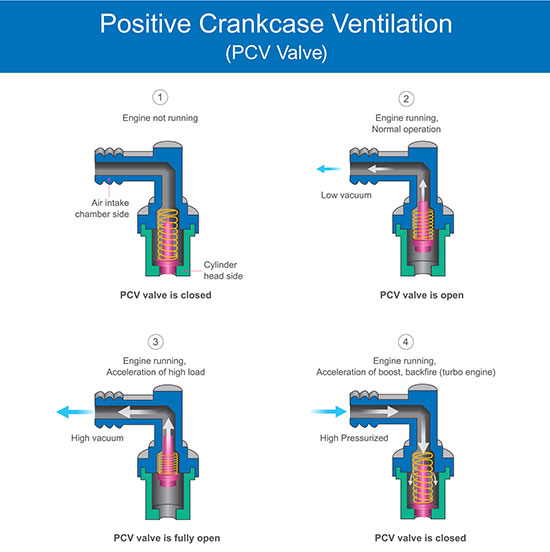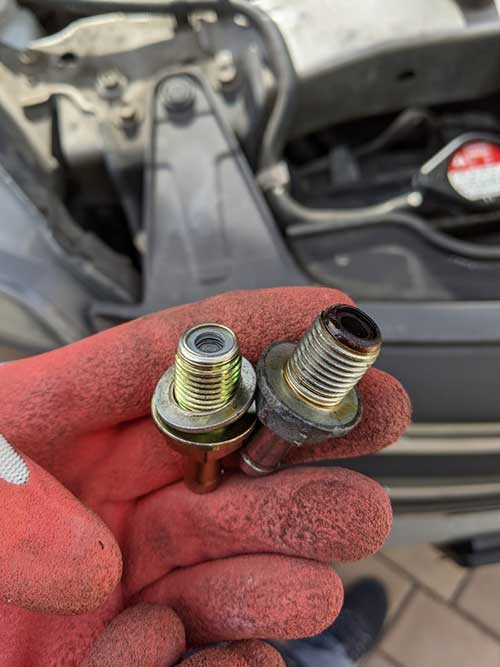Although very few drivers know about this piece, a PCV valve or positive crankcase ventilation is a very important part of the car engine. In this article we will talk about the PCV valve, what it is and how can it help the engine.
Contents
What is a PCV valve?
PCV valve plays a crucial role in the proper functioning of the engine. PCV abbreviation stands for positive crankcase ventilation. The crankcase is located at the bottom of the engine and has the role of storing the engine oil.
Gases are formed in the engine when fuel is burned, and most of them end up in the exhaust, but some still manage to “escape” and reach the crankcase. This is not a good thing because gases can mix with the oil in the crankcase and can form sludge, which leads to engine clogging.
The PCV valve has the role to eliminate these gases from the crankcase by recycling these gases into the intake and mixing them with fuel to be burned in the engine.
How does a PCV valve work?
Heat exchanges take place when the engine is running. From these exchanges, heating, and cooling will automatically result in condensation. Besides lubrication and cooling, oil plays another important role. The oil absorbs moisture to prevent corrosion, like a sponge.
Therefore, moisture is eliminated when it reaches high temperatures but along with moisture, fine steam of oil or fuel evaporates as well
If the moisture in the oil evaporates, then steam will also be generated. On older car models, this steam was released into the air, but ecological laws forced engineers to invent a new way of removing these gases. Their idea was to introduce these vapors into the combustion circuit. So the PCV valve is basically an internal ventilation system.

Why is a PCV valve important?
As I said above the role of this engine part is to reintroduce the gases in the circuit to be burned. Without it the engine will fail in time, also if you’re driving at high speeds the gases inside the crankcase will cause pressure inside which will lead to damaged seals, blown gaskets, and oil leaks.
Symptoms of a bad PCV valve
Will such valve damage or can it go bad? In this entire internal ventilation system, the most important part is this PCV valve, not the hoses or other parts.
Most often problems with the PCV valve are found especially in cars with petrol engines. Because the valve has plastic hoses and is located in a place with high temperatures, it is natural for this valve to fail and be changed at some point.
It sometimes happens that you can experience backfires, in which case the throttle and PCV valve are closed. It is very important to understand how this whole system works so that we can correctly associate the problems with a bad PCV valve.
If the valve does not close properly, for example at idle, if it stays open too long it will allow a too strong suction of the steam in the intake.

The most common symptoms of a bad PCV valve:
Misfires
Failures can occur during idling or when accelerating the car if the mixture is improper in case of a defective PCV valve. If the mixture is too poor then the cylinders will not ignite. If the mixture is too rich then the spark can stop, causing misfires as well.
Harder acceleration
Because the mixture is improper you can feel an acceleration of the car at both high RPM and low RPM
Oil leaks and its increased consumption.
When the PCV valve fails, you will notice, at higher speeds, that the gases create pressure in the crankcases that can lead to damaged gaskets, blown seals, and eventually, their lack will cause oil leaks.
White, black, or blue exhaust fumes
If the mixture is poor or rich, then the car exhaust will eliminate black or white smoke, depending on the type of mixture.
The smoke removed can also be blue if the oil reaches the combustion chamber. All three of these types of smoke can be symptoms of a faulty PCV valve.
Rough idle or high RPM
If the PCV valve is bad then it will no longer be able to control the air between the crankcase and the intake, resulting in a high RPM at idle. So it is good to check the PCV valve if you see this manifestation.
Flashing check engine light
If on older cars, the check engine for this error does not light up, in modern cars, if you have problems with the PCV valve and the check engine lights up and flashes, this might indicate problems with the PCV valve. It’s better to use an OBD scanner though.
In addition to the very high oil consumption, the bad symptoms can be oil deposits on the valves, heavy engine starting, oscillating idling and the engine can even stop out of the blue.
In older car models, this valve is mechanical, it is not controlled by any computer, it does not communicate with the ECU (electronic control unit), from here errors can occur to the oxygen sensor (Lambda Probe) or the MAF / MAP sensor.
When to change the PCV valve?
This valve does not have an exact lifespan, it can work very well for many miles, or it can fail at some point, everything depends on the driver’s driving style.
The PCV valve can last over 100,000 miles, but in other cases, it can give up after 30,000 miles, if the driving is not ok, or the car is driven on short distances.
Why is this valve so badly affected by short distances? Well, first of all, if we drive the car short distances, the oil does not have time to reach a temperature at which moisture can evaporate, which leads to faster oxidation of the valve, implicitly blocking it. Second, the oil degrades much faster so it loses its lubrication properties.
If you want to change this PCV valve, we recommend that you go to a specialized workshop to perform this operation, but if you have some knowledge of mechanics, you can change it yourself because it is not a very difficult operation to do.
So you only need a few keys to remove the valve from its support and a screwdriver to remove the hoses. When installing the new PCV valve, special sealing substances are usually used, but we recommend that you also use Teflon tape for metal threads (the one guaranteed for gas and water networks). If not, you can very well use silicone, especially for high temperatures.
A tip, be careful when you replace all the hoses, not to confuse them.
How much does a PCV valve cost?
A new PCV valve costs between $ 50 and $ 100. For such a small amount, it is worth changing it if you suspect that it may have something to do with excessive oil consumption.
